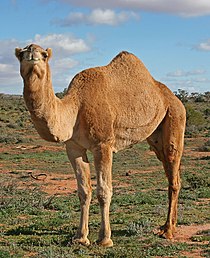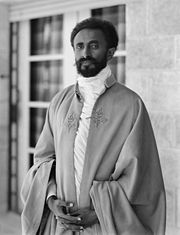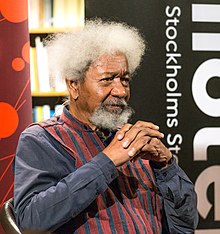Portal:Africa



Africa is the world's second-largest and second-most populous continent after Asia. At about 30.3 million km2 (11.7 million square miles) including adjacent islands, it covers 20% of Earth's land area and 6% of its total surface area. With 1.4 billion people0 as of 2021, it accounts for about 18% of the world's human population. Africa's population is the youngest among all the continents; the median age in 2012 was 19.7, when the worldwide median age was 30.4. Despite a wide range of natural resources, Africa is the least wealthy continent per capita and second-least wealthy by total wealth, ahead of Oceania. Scholars have attributed this to different factors including geography, climate, corruption, colonialism, the Cold War, and neocolonialism. Despite this low concentration of wealth, recent economic expansion and the large and young population make Africa an important economic market in the broader global context. Africa has a large quantity of natural resources and food resources, including diamonds, sugar, salt, gold, iron, cobalt, uranium, copper, bauxite, silver, petroleum, natural gas, cocoa beans, and.
Africa straddles the equator and the prime meridian. It is the only continent to stretch from the northern temperate to the southern temperate zones. The majority of the continent and its countries are in the Northern Hemisphere, with a substantial portion and a number of countries in the Southern Hemisphere. Most of the continent lies in the tropics, except for a large part of Western Sahara, Algeria, Libya and Egypt, the northern tip of Mauritania, and the entire territories of Morocco, Ceuta, Melilla, and Tunisia which in turn are located above the tropic of Cancer, in the northern temperate zone. In the other extreme of the continent, southern Namibia, southern Botswana, great parts of South Africa, the entire territories of Lesotho and Eswatini and the southern tips of Mozambique and Madagascar are located below the tropic of Capricorn, in the southern temperate zone.
Africa is highly biodiverse; it is the continent with the largest number of megafauna species, as it was least affected by the extinction of the Pleistocene megafauna. However, Africa also is heavily affected by a wide range of environmental issues, including desertification, deforestation, water scarcity, and pollution. These entrenched environmental concerns are expected to worsen as climate change impacts Africa. The UN Intergovernmental Panel on Climate Change has identified Africa as the continent most vulnerable to climate change.
The history of Africa is long, complex, and varied, and has often been under-appreciated by the global historical community. Africa, particularly Eastern Africa, is widely accepted to be the place of origin of humans and the Hominidae clade, also known as the great apes. The earliest hominids and their ancestors have been dated to around 7 million years ago, including Sahelanthropus, Australopithecus africanus, A. afarensis, Homo erectus, H. habilis and H. ergaster, the earliest Homo sapiens (modern human) remains, found in Ethiopia, South Africa, and Morocco, date to circa 233,000, 259,000, and 300,000 years ago, respectively, and Homo sapiens is believed to have originated in Africa around 350,000–260,000 years ago. Africa is also considered by anthropologists to be the most genetically diverse continent as a result of being the longest inhabited. (Full article...)
Selected article –

Makuria (Old Nubian: ⲇⲱⲧⲁⲩⲟ, Dotawo; Greek: Μακουρία, romanized: Makouria; Arabic: المقرة, romanized: al-Muqurra) was a medieval Nubian kingdom in what is today northern Sudan and southern Egypt. Its capital was Dongola (Old Nubian: Tunjul) in the fertile Dongola Reach, and the kingdom is sometimes known by the name of its capital.
Coming into being after the collapse of the Kingdom of Kush in the 4th century, it originally covered the Nile Valley from the 3rd cataract to somewhere south of Abu Hamed at Mograt Island. The capital of Dongola was founded around 500 and soon after, in the mid-6th century, Makuria converted to Christianity. Probably in the early 7th century Makuria annexed its northern neighbour Nobatia, now sharing a border with Byzantine Egypt. (Full article...)Featured pictures –
Did you know (auto-generated) -

- ... that the Shady Rest Golf and Country Club was the home of John Shippen, the first African American to compete in the U.S. Open?
- ... that the African zebrawood is in danger of becoming extinct?
- ... that African-American journalist Erna P. Harris was called a "fearless critic" of the internment of Japanese Americans by the US government during World War II?
- ... that Kenyan coffee farmer "Pinkie" Jackson amassed Africa's largest collection of native butterflies?
- ... that prior to becoming West Virginia's first African-American judge, Leon P. Miller was McDowell County's assistant prosecuting attorney, a Welch city councilman, and U.S. Attorney for the Virgin Islands?
- ... that South African politician Speedy Mashilo was kidnapped for seven hours?
Categories
Selected biography –
Akinwande Oluwole Babatunde "Wole" Soyinka CFR (/ˈwoʊleɪ sɔɪˈ(j)ɪŋkə, - ʃɔɪˈ-/ WOH-lay s(h)oy-(Y)ING-kə; Yoruba: Akínwándé Olúwọlé Babátúndé "Wọlé" Ṣóyíinká, pronounced [wɔlé ʃójĩnká]; born 13 July 1934) is a Nigerian playwright, novelist, poet, and essayist in the English language. He was awarded the 1986 Nobel Prize in Literature for his "wide cultural perspective and... poetic overtones fashioning the drama of existence", the first sub-Saharan African to win the Prize in literature.
In July 2024, President Bola Tinubu renamed the National Arts Theatre in Iganmu, Lagos, after Soyinka. Tinubu announced this in a tribute he wrote to celebrate Soyinka in commemoration of his 90th birthday. (Full article...)Selected country –
 |
 |
||

| |||
Guinea, officially the Republic of Guinea (French: République de Guinée), is a nation in West Africa, formerly known as French Guinea. It borders Guinea-Bissau and Senegal to the north, Mali to the north and north-east, Côte d'Ivoire to the south-east, Liberia to the south, and Sierra Leone to the south-west. It encompasses the water source of the Niger, Senegal, and Gambia rivers. The name Guinea is used for the region of most of Africa's west coast south of the Sahara desert and north of the Gulf of Guinea. Guinea is sometimes called Guinea-Conakry per its capital, to differentiate it from the neighboring Guinea-Bissau (whose capital is Bissau).
Richly endowed with minerals, Guinea possesses over 25 billion metric tons of bauxite–perhaps up to one half of the world's reserves. In addition, Guinea's mineral wealth includes more than 4 billion tons of high-grade iron ore, significant diamond and gold deposits, and undetermined quantities of uranium. Soil, water, and climatic conditions provide opportunities for large-scale irrigated farming and agro industry. (Read more...)
Selected city –

Francistown is the second-largest city in Botswana, with a population of about 103,417 and 147,122 inhabitants for its agglomeration at the 2022 census. It is located in eastern Botswana, about 400 kilometres (250 mi) north-northeast from the capital, Gaborone. Francistown is located at the confluence of the Tati and Ntshe rivers, and near the Shashe River (tributary to the Limpopo) and 90 kilometres (56 mi) from the international border with Zimbabwe.
Francistown was the centre of Southern Africa's first gold rush and is still surrounded by old and abandoned mines. The City of Francistown is an administrative district, separated from North-East District. It is administered by Francistown City Council. The main language spoken and used in and around Francistown is Kalanga. Other languages used in the area are isiNdebele, ChiShona as well as SeTswana. Francistown is the only city in Botswana with an English name. There are no English-language named towns and only a couple of villages with English names. (Full article...)In the news
- 12 February 2024 –
- Two boats collide on the Congo River near Kinshasa, Democratic Republic of the Congo; with the death toll remains unclear. (AP)
- 11 February 2024 – 2023 Africa Cup of Nations
- In association football, hosts Ivory Coast win their third Africa Cup of Nations by defeating Nigeria 2–1 in the final. Sébastien Haller scores the winning goal in the 81st minute. (The Guardian)
- 10 February 2024 – Somali civil war
- Four Emirati soldiers and a Bahraini military officer are killed, while ten other people are injured, when a soldier opens fire at a military base in Mogadishu, Somalia, before being killed in the ensuing shootout. Al-Shabaab claims responsibility. (AP)
- 10 February 2024 –
- A Eurocopter EC130 helicopter crashes near Nipton, California, United States, killing all the six people on board, including Nigerian banker Herbert Wigwe. (CBS News)
- 10 February 2024 – 2023–2024 Senegalese protests
- Violent protests occur in Senegal following an announcement by President Macky Sall that presidential elections have been delayed from February 25 to December 15. (Sky News)
- 9 February 2024 –
- At least 18 people are killed during a collision between a bus and a truck on a road in Kinshasa, Democratic Republic of the Congo. (AP)
Updated: 16:33, 14 February 2024
General images -
Africa topics
More did you know –
- ... that Safi Faye's 1975 film Kaddu Beykat was the first commercially distributed feature film made by a Sub-Saharan African woman?
- ... that legendary princess Yennenga, the "mother" of the Mossi people, was such a great warrior that her father refused to allow her to marry?
- ... that Safi Faye is a Senegalese film director whose work is better known in Europe than in her native Africa?
- ...that Mohamed Camara's 1997 film Dakan was the first West African film to explore homosexuality?
Related portals
Major Religions in Africa
North Africa
West Africa
Central Africa
East Africa
Southern Africa
Associated Wikimedia
The following Wikimedia Foundation sister projects provide more on this subject:
-
Commons
Free media repository -
Wikibooks
Free textbooks and manuals -
Wikidata
Free knowledge base -
Wikinews
Free-content news -
Wikiquote
Collection of quotations -
Wikisource
Free-content library -
Wikispecies
Directory of species -
Wikiversity
Free learning tools -
Wikivoyage
Free travel guide -
Wiktionary
Dictionary and thesaurus























































































